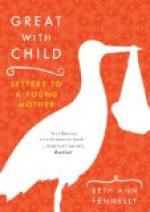“The masters of the world were brought up with this spare diet, and the young gentlemen of Rome felt no want of strength or spirit because they ate but once a day. Or if it happened by chance that any one could not fast so long as till supper, their only set meal, he took nothing but a bit of dry bread, or at most a few raisins or some such slight thing with it, to stay his stomach. And more than one set meal a day was thought so monstrous that it was a reproach, as low as Caesar’s time, to make an entertainment, or sit down to a table, till towards sunset. Therefore I judge it most convenient that my young master should have nothing but bread for breakfast. I impute a great part of our diseases in England to our eating too much flesh, and too little bread. Dry bread, though the best nourishment, has the least temptation.”
I shall not undertake to defend all the sentiments of Mr. Locke in these extracts; but in regard to the main point—the nutritive properties and wholesome tendency of bread, and the importance of making it a principal article of diet for children—I think his views are just. In short, they do not differ, substantially, from those of a large proportion of the best writers on this subject in every country, during the last three hundred years. As if with one voice, they dissuade from the use of too much animal food for the young, and encourage the use of a larger proportion of vegetable food—bread, plain puddings, rice, potatoes, turnips, beets, apples, pears, &c., and milk.
Yet they all, or nearly all, seem to write just as if they did not expect to be believed; or if believed, to be followed. They seem to regard mankind as so inveterately attached to old habits, and so much addicted to flesh eating, that there is little hope of reclaiming them.
Now, though my opinions are no more entitled to respect than many of theirs, I hope for greater success than they appear to do. I expect that many young mothers who read this work, will be led to think and inquire further on the subject; and if they find that the views here advanced are in accordance with reason, and common sense, and higher authority, I am not without hope that they will reform, and do what they can to reform their neighbors.
I have dwelt the longer, in this section, on the general principles of diet, because I am of opinion that whatever is true, on this subject, in regard to the diet of children, soon after weaning, is equally, or nearly equally applicable to the whole of childhood, youth, manhood and age. It is not true that one period of life, and one mode of employment, demands a diet essentially different from that which is demanded at another period, and in other circumstances; provided always, that the individual is in health. Occasional instances of the kind, there may be; but they are not numerous.
The digestive powers of the young are more nearly as strong as those of the adult than is usually admitted, and they are much more active. They require a less quantity of food, undoubtedly; and they should be fed at shorter intervals. But as a general rule, what is best for them, as regards its quality, at three years old, is best for them at thirty; or, should they live so long, at ninety. I repeat it; there is very little difference in the nature of the food required ever after teething.




